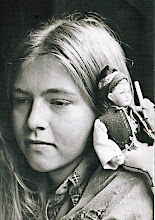The card, sent to Mr. Denis Purcell, in 1915 says:
Just a line to let you know I won one hundred bucks on the fight. I am getting that watch cleaned, I thought Johnson was due for a knock out.
A hundred bucks was a lot of money then, so you know it had to be a big fight.
John Arthur "Jack" Johnson was also known as the Galveston Giant. He was the first black heavyweight boxing champion (1908-1915.) Each of Johnson's fights, from the 1908 victory over Canadian world champion Tommy Burns, until the match where he was defeated, awakened a huge amount of racial animosity. After Johnson's first and unprecedented victory, Jack London called for the Great White Hope (James Jeffries) to take the title back. Johnson managed to defeat every opponent he was matched with, including James Jeffries in 1910. Here's a photo of Johnson.
A number of companies had filmed the Johnson/Jeffries fight and distributed the footage as a documentary. This was an unwelcome suggestion of black supremacy for many white people, and there was an effort to suppress the film. In fact, because of this film, Congress banned prizefight films from being distributed across state lines in 1912, a ban that wasn't lifted until 1940.
Although Johnson's victory over Jeffries may have silenced some critics, it also caused race riots all across the United States. White boxing fans had staked their hopes on Jeffries, and those hopes had been dashed. Black boxing fans, on the other hand, were in a celebratory mood, which only made the situation worse. In the ensuing riots, 23 blacks and two whites were killed, and many more were injured.
On April 15, 1915, Johnson lost his title to Jess Willard, ending his run as heavyweight boxing champion. This was the bout on which our sender won a hundred bucks.
Beyond boxing, Johnson was certainly a very courageous and eclectic man. He had an interest in opera and opened a nightclub in Harlem. He later sold the nightclub, which became known as the Cotton Club. He was married three times, always to white women, at least two of whom appear to be former prostitutes. Johnson was arrested and convicted of violating the Mann Act for taking one of these women across state lines. Afterward, he fled the country and lived abroad with the woman. Although there have been efforts to grant him a posthumous presidential pardon (most recently spearheaded by John McCain, Peter King, and Frank Burns), they have yet to be successful.
Jack Johnson died in a car crash in 1946. he was driving erratically after being refused service at a diner near Raleigh, North Carolina when the accident happened.


















Christine: Thanks for the offer of the postcards from Nebraska and West Virginia. I'd love one from west virginia, since nebraska already come and gone. I don't use outlook so can't send you an email directly. If you email me at mfdoan(at)hotmail.com, I'll send you my address.
ReplyDeleteThanks! And thanks so much for being a regular reader and commenter of a plethora of postcards!
Don't you just love the way that postcards call out to us to tell stories.
ReplyDeleteFascinating. Funny the interesting things you find, that ordinarily you'd be none the wiser to.
ReplyDelete~Randy
One step back and she will be tripping over the cannonballs. Fascinating story of Jack Johnson, tough times to be black fighter.
ReplyDeleteI might be wrong, but I think the postcard says "I am getting that match cleaned..." maybe a comment on the outcome of the fight?
ReplyDeleteHi Meghan,
ReplyDeleteWell, you know, that's what I thought too - and you're probably right. But I thought it almost made more sense as a variation of "clean his clock", which has been a particularly popular sports phrase. here's the Wiktionary definition:
To clean someone's clock
1. (idiomatic) To defeat decisively, in a physical fight or other competition or negotiation.
Synonyms
* mop the floor with somebody
* trounce
So, I don't know. What do you think? It does look a little bit more like an M.
'Watch' would seem to make more sense in the context of the sentence, but I'm not sure why he wouldn't just use 'clock' instead... It is possible that he just had a very nice pocket watch (which at that time could cost several hundred dollars, while ultra luxury ones sold for +/- $10,000!!) that he simply was going to use his winnings to have cleaned. I find the most peculiar thing about the card to be the font used on the front, the modern nature of which is completely out of character with the image. Coincidentally, I just read an article about Johnson in the past couple weeks, think it as a book review in the NY Times...
ReplyDeleteAnyone who likes (or thinks they might like) jazz-funk fusion should check out Miles Davis' 1970 classic A Tribute to Jack Johnson. Fiery, passionate, and intelligent -- just like its subject.
ReplyDeletegreat story
ReplyDeleteBrilliant postcard! I love the wacky design. Lovely typeface on the caption. The gun can only be aimed up or down, but that's not as bad as the fact it may be pointing inland. Are the enormous brown watermelons supposed to represent cannon balls? do the gunners have to slice them up first before putting them in the barrel? I love the jaunty angle of his hat too. Do ladies really like men with swords who take them to see a bg gun?
ReplyDelete